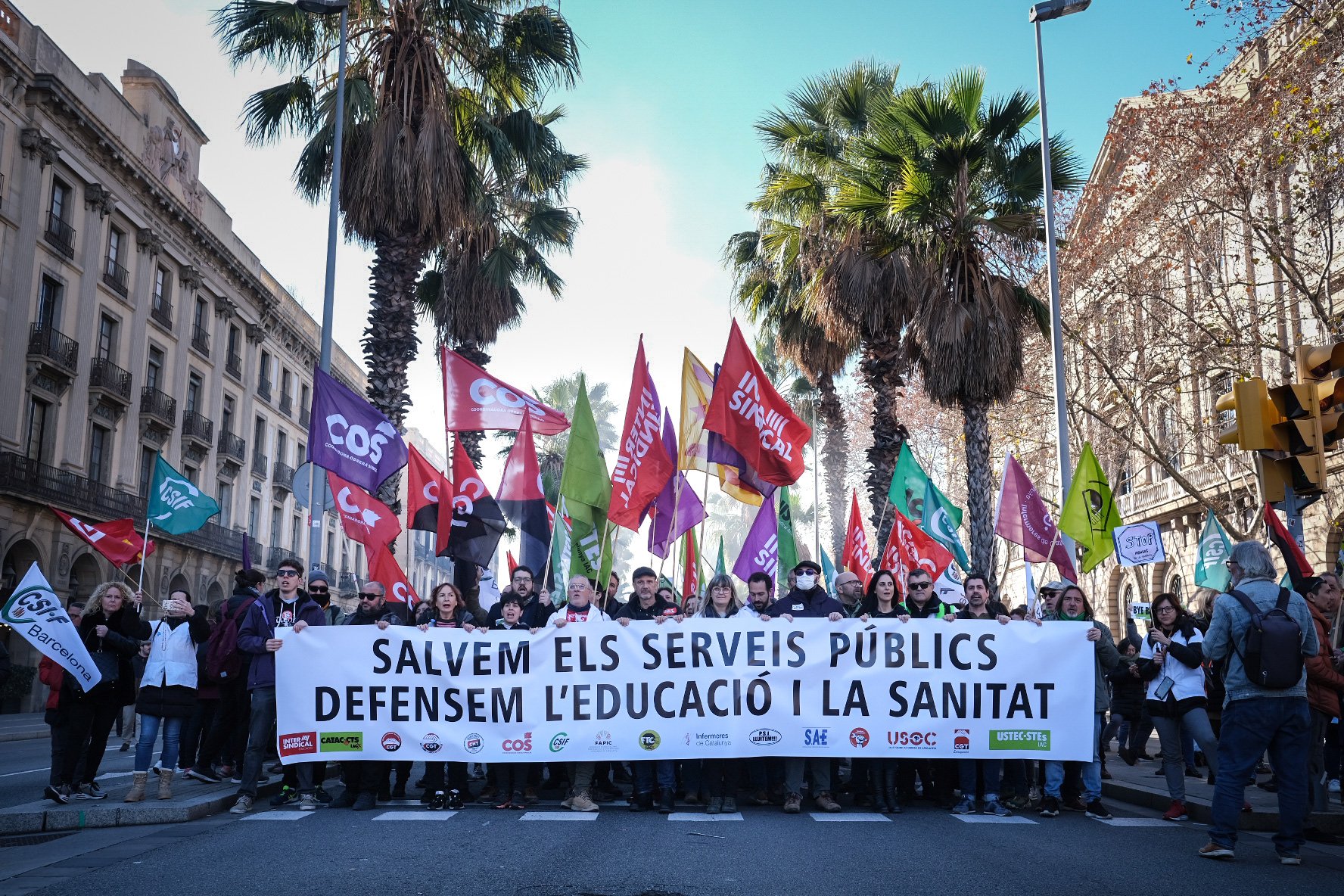The streets of central Barcelona filled this Wednesday with striking teachers, doctors and taxi drivers on the first major day of industrial actions. The response to the first of the demonstrations of this first day, that of health professionals in front of the Catalan health department, was overwhelming, with more than 9,000 people taking part. The second protest, which started from Plaça Sant Jaume and marched to the Parliament of Catalonia, uniting teachers and health workers, was also large, reaching 6,500 participants, according to the Barcelona police. It was in this demonstration that the unions who called the strike set out their demands for a recovery of working conditions, to reverse the cuts which "started a decade ago" and to increase the resources budgeted to health and education.
The unions who called the strike action, which included USTEC-STEs, Intersindical, CGT, Infermeres de Catalunya, CATAC, USOC, CNT, FAPIC, CSIF and CCOO, demanded the resignation of the Catalan minister of education, Josep Gonzàlez-Cambray, during the mobilization. Chants heard during the protest included "Having a vocation does not mean exploitation", "Reverse the cuts, or strike, strike, strike" as well as direct warnings to the Catalan government: "Esquerra, if this lasts, this will hurt you" - aimed at the governing ERC party. The crowd rallied at 11am and, at half-past twelve, all the columns headed towards the Parliament of Catalonia, along Via Laietana, Passeig d'Isabel II, Avinguda de Marquès de l'Argentera and, once inside Parc de la Ciutadella, gathered in front of the doors of the Catalan parliament, where they read the manifesto.

In statements to the media, prior to the start of the demonstration, Iolanda Segura, spokesperson for the USTEC-STEs teachers union, stressed the need to "defend public services" and emphasized the need to "protect" the month of July for teacher training, as well as in the desire to address the usefulness of starting the school year early, as was done in September 2022 - which teachers opposed. In a similar vein, from the CCOO Education Federation they report that schools are "overwhelmed" and the Intersindical union has urged the Catalan government to "reverse this year's cuts", making a modification in the budget allocation. In fact, the Catalan education depatrtment and the unions are far apart.

Meanwhile, the spokesperson for the health workers union Mesa Sindical de Sanitat, Anna Alcalà, explained that the situation in the sector is "deplorable" because public services are "very devalued". The demands the health workers raise are the equalization upwards of all salary agreements, retirement at the age of 60, a 35-hour working day and lower ratios to avoid the "overload" that the system suffers from. They also maintain that since 2008 they have lost 30% of their purchasing power, so urge the Catalan health ministry to put salaray improvements and "effective solutions" on the table.
Once in Parliament, several CUP deputies left the chamber to talk to one of the unions, a gesture that Jéssica Albiach and David Cid, of En Comú Podem, replicated. In addition, the suspended president of Parliament, Laura Borràs, and some deputies from Junts also went outside to listen to the unions. Borràs was jeered by some of the unions.
Education unions highlighted that "public investment in education is far from the 6% of GDP established by the Education Law itself". In fact, they say, "it doesn't even reach 3% of GDP, placing us at the bottom of Europe". Other complaints they make are the fact that there are "in many cases ratios of more than 30 students per classroom" or the attack on language immersion: "It has been attacked by successive judicial campaigns, but also by new Catalan legislation which, under the pretext of school autonomy, aims to fragment the system".
The second day of the strike will be this Thursday, with more mobilizations, and on Saturday 28 there will be a new unitary concentration of teachers and health workers.

